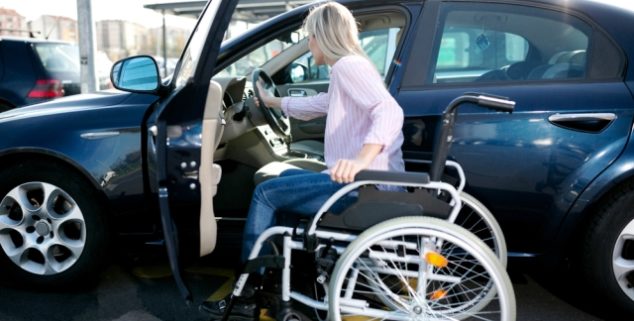Opinion
California remains inaccessible for drivers with disabilities
 A disabled driver attempts to enter her vehicle. (Photo: didesign021, via Shutterstock)
A disabled driver attempts to enter her vehicle. (Photo: didesign021, via Shutterstock)Reliable transportation is an important part of everyday life, from getting to work, to going to the doctor, to staying connected with friends and family.
However, for nearly 8 million Californians with disabilities, transportation can be anything but reliable, especially for those who drive.
Take, for example, filling up at a gas station.
After finding the most accessible gas station option, parking the car, taking out a wheelchair and going over to the pump, the driver finds that the call button does not work, the credit card reader is out of reach, or the buttons to select the fuel’s grade are too high. What can they do then to get fuel?
The simple truth is that traditional gas stations are not designed for drivers with disabilities.
These types of situations put drivers with disabilities into vulnerable positions to ask strangers for help using the credit card machine or giving them their personal bank information, like PIN numbers, just to get gas. Even if everything goes according to plan, the gas station experience for a driver with a disability can still take 30 minutes or longer.
The simple truth is that traditional gas stations are not designed for drivers with disabilities, and even the ADA has no oversight to hold them accountable for broken call buttons.
For me, personally, the fact that I can’t put gas in my car is the reason why I haven’t bothered to get my driver’s license. The risks to get gas reliably and safely at a gas station are just too high.
Assembly Bill (AB) 2563, introduced earlier this year offered a solution to this problem by allowing mobile fueling on demand to expand responsibly throughout the state. Laws regulating fuel dispensing were written before mobile fueling technology existed, which means that most of California’s air districts have outdated rules that do not allow for mobile fueling.
AB 2563 overwhelmingly passed the Assembly Transportation and Natural Resources committees with bipartisan support, but unfortunately it died last week when it failed to move off of the Appropriations Committee suspense file.
This means at least another year will pass that drivers with disabilities will be denied a viable alternative to the gas station.
Individuals can become disabled at any point in their lives—at birth, as we age, or if an accident happens. Future drivers with disabilities will need equal access to fuel to keep their independence and authorizing mobile fueling ensures they will.
AB 2563 was the solution we needed yesterday.
—
Editor’s Note: Long Beach resident Jennifer Kumiyama is a leader with Californians for Smart Fueling coalition. She is also a delegate to the 70th Assembly District in the California Democratic Party.
Want to see more stories like this? Sign up for The Roundup, the free daily newsletter about California politics from the editors of Capitol Weekly. Stay up to date on the news you need to know.
Sign up below, then look for a confirmation email in your inbox.

Leave a Reply